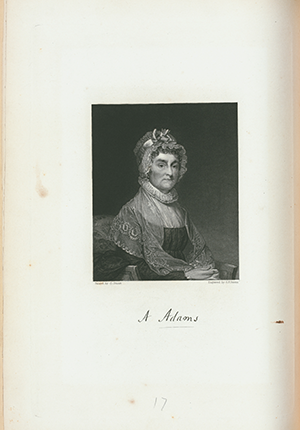Historic Document
Letter to John Adams (1776)
Abigail Adams | 1776

Emmet Collection of Manuscripts Etc. Relating to American History, The New York Public Library
Summary
Abigail Adams was born to a prominent family in Massachusetts in 1744. Like other women of her generation, she had no formal education. However, she took advantage of her family’s extensive library to master a range of topics. In 1764, she married John Adams. As her husband’s prominence grew and his time away from home increased, Abigail managed the family’s farm and its business affairs while also raising their children. Throughout their lives, Abigail and John Adams wrote each other frequently, exploring topics both personal and political. Throughout her husband’s career, Abigail was a trusted advisor. She was also an early advocate for women’s rights, including access to education. In this letter, Abigail urged her husband—then, serving in the First Continental Congress—to “remember the ladies.” She added, “Do not put such unlimited power into the hands of husbands. Remember all men would be tyrants if they could."
Selected by

The National Constitution Center
Document Excerpt
Abigail Adams to John Adams, March 31, 1776
I wish you would ever write me a Letter half as long as I write you; and tell me if you may where your Fleet are gone? What sort of Defence Virginia can make against our common Enemy? Whether it is so situated as to make an able Defence? Are not the Gentery Lords and the common people vassals, are they not like the uncivilized Natives Brittain represents us to be? I hope their Riffel Men who have shewen themselves very savage and even Blood thirsty; are not a specimen of the Generality of the people.
I am willing to allow the Colony great merrit for having produced a Washington but they have been shamefully duped by a Dunmore.
I have sometimes been ready to think that the passion for Liberty cannot be Eaquelly Strong in the Breasts of those who have been accustomed to deprive their fellow Creatures of theirs. Of this I am certain that it is not founded upon that generous and christian principal of doing to others as we would that others should do unto us. . . .
I feel very differently at the approach of spring to what I did a month ago. We knew not then whether we could plant or sow with safety, whether when we had toild we could reap the fruits of our own industery, whether we could rest in our own Cottages, or whether we should not be driven from the sea coasts to seek shelter in the wilderness, but now we feel as if we might sit under our own vine and eat the good of the land.
I feel a gaieti de Coar to which before I was a stranger. I think the Sun looks brighter, the Birds sing more melodiously, and Nature puts on a more chearfull countanance. We feel a temporary peace, and the poor fugitives are returning to their deserted habitations.
Tho we felicitate ourselves, we sympathize with those who are trembling least the Lot of Boston should be theirs. But they cannot be in similar circumstances unless pusilanimity and cowardise should take possession of them. They have time and warning given them to see the Evil and shun it.—I long to hear that you have declared an independancy—and by the way in the new Code of Laws which I suppose it will be necessary for you to make I desire you would Remember the Ladies, and be more generous and favourable to them than your ancestors. Do not put such unlimited power into the hands of the Husbands. Remember all Men would be tyrants if they could. If perticuliar care and attention is not paid to the Laidies we are determined to foment a Rebelion, and will not hold ourselves bound by any Laws in which we have no voice, or Representation.
That your Sex are Naturally Tyrannical is a Truth so thoroughly established as to admit of no dispute, but such of you as wish to be happy willingly give up the harsh title of Master for the more tender and endearing one of Friend. Why then, not put it out of the power of the vicious and the Lawless to use us with cruelty and indignity with impunity. Men of Sense in all Ages abhor those customs which treat us only as the vassals of your Sex. Regard us then as Beings placed by providence under your protection and in immitation of the Supreem Being make use of that power only for our happiness.




